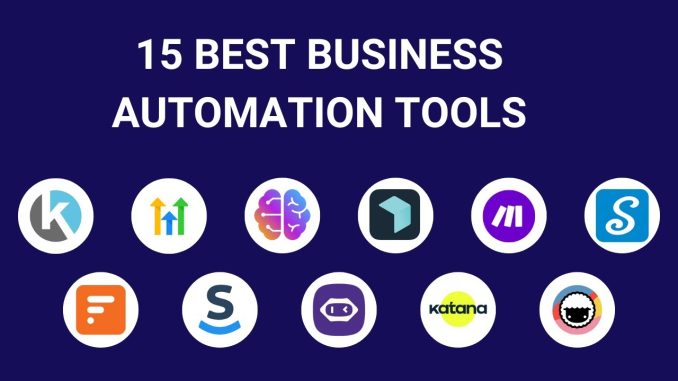
In today’s fast-paced digital world, businesses that leverage automation gain a significant advantage over their competitors. Automating repetitive tasks can save time, reduce errors, and enhance productivity. Whether you run a small business or a large enterprise, software tools can help streamline operations, improve efficiency, and boost profitability.
This guide explores the benefits of business automation, the best software tools for different tasks, and how to implement them effectively.
Why Automate Your Business?
Automation is not just about reducing workload; it’s about optimizing operations to allow businesses to focus on growth and innovation. Some key benefits include:
- Increased Efficiency – Automation eliminates manual tasks, allowing employees to focus on higher-value work.
- Cost Savings – By reducing labor-intensive processes, businesses can save money on staffing and operational expenses.
- Error Reduction – Automated processes are less prone to human error, leading to more accurate and consistent results.
- Scalability – As businesses grow, automation ensures that processes remain efficient without increasing overhead costs.
- Better Customer Experience – Faster response times, personalized communication, and efficient service improve customer satisfaction.
Now, let’s explore the best software tools to automate different aspects of your business.
1. Customer Relationship Management (CRM) Automation
A CRM system helps businesses manage customer interactions, track sales, and automate follow-ups. Instead of manually handling customer data, CRM tools centralize information and improve communication.
Best CRM Automation Tools:
- HubSpot CRM – Automates email marketing, lead tracking, and customer interactions.
- Salesforce – Provides AI-driven automation for sales, marketing, and customer service.
- Zoho CRM – Offers workflow automation, sales forecasting, and AI-powered analytics.
How It Helps:
- Automates lead capturing and follow-ups.
- Sends personalized email campaigns based on customer behavior.
- Tracks customer interactions for better engagement.
2. Email Marketing Automation
Manually sending emails to every prospect or customer is inefficient. Email automation software helps schedule and personalize messages, ensuring better engagement without additional effort.
Best Email Automation Tools:
- Mailchimp – Automates email campaigns with segmentation and analytics.
- ActiveCampaign – Offers advanced automation for personalized customer journeys.
- Constant Contact – Great for automated newsletters and drip campaigns.
How It Helps:
- Sends automated welcome emails and promotional offers.
- Segments audiences for targeted campaigns.
- Tracks open rates, click-throughs, and conversions for performance insights.
3. Social Media Automation
Managing multiple social media platforms can be overwhelming. Automation tools help schedule posts, engage with audiences, and analyze performance without manual effort.
Best Social Media Automation Tools:
- Hootsuite – Schedules posts across multiple platforms and provides analytics.
- Buffer – Simplifies social media scheduling and engagement.
- Sprout Social – Offers AI-powered automation for content posting and customer interactions.
How It Helps:
- Schedules posts in advance to maintain consistency.
- Automates responses to customer inquiries using chatbots.
- Tracks engagement and performance metrics.
4. Accounting and Finance Automation
Handling finances manually can lead to errors and wasted time. Accounting automation tools streamline invoicing, payroll, and expense tracking.
Best Accounting Automation Tools:
- QuickBooks – Automates invoicing, tax calculations, and financial reporting.
- FreshBooks – Simplifies expense tracking and automated billing.
- Xero – Provides real-time financial insights and bank reconciliation.
How It Helps:
- Generates automated invoices and payment reminders.
- Syncs with bank accounts to track expenses.
- Prepares tax reports to simplify compliance.
5. Project Management Automation
Effective project management is essential for business success. Automation tools help teams collaborate, track progress, and meet deadlines efficiently.
Best Project Management Tools:
- Trello – Uses automation to organize tasks with drag-and-drop simplicity.
- Asana – Automates task assignments and progress tracking.
- Monday.com – Offers workflow automation for project planning and execution.
How It Helps:
- Automates task assignments based on workflow rules.
- Sends automatic reminders for deadlines and updates.
- Tracks project progress in real time.
6. E-commerce Automation
E-commerce businesses benefit greatly from automation, from order processing to customer support.
Best E-commerce Automation Tools:
- Shopify – Automates inventory management and order processing.
- WooCommerce – Integrates with plugins for automated marketing and payments.
- Klaviyo – Automates personalized email campaigns for e-commerce stores.
How It Helps:
- Sends automatic order confirmations and shipping updates.
- Manages inventory to prevent stock issues.
- Provides AI-driven product recommendations.
7. Human Resources (HR) Automation
Managing HR processes manually is time-consuming. Automation tools simplify hiring, payroll, and employee management.
Best HR Automation Tools:
- BambooHR – Automates employee onboarding and performance tracking.
- Gusto – Handles payroll, tax filing, and benefits administration.
- Workday – Provides AI-driven HR automation for large enterprises.
How It Helps:
- Automates job postings and candidate screening.
- Manages payroll and tax compliance effortlessly.
- Tracks employee performance with AI-driven insights.
8. Chatbots and Customer Support Automation
Providing instant customer support enhances satisfaction and loyalty. AI-powered chatbots and helpdesk automation tools reduce response times and improve service.
Best Chatbot & Support Automation Tools:
- Zendesk – Automates ticketing and customer support workflows.
- Drift – Provides AI-driven chatbots for sales and support.
- Intercom – Automates customer interactions with live chat and chatbots.
How It Helps:
- Provides 24/7 automated customer support.
- Routes inquiries to the right team member automatically.
- Collects and analyzes customer feedback.
How to Implement Automation in Your Business
- Identify Repetitive Tasks – Analyze which processes take up the most time and can be automated.
- Choose the Right Tools – Select software based on your business needs and budget.
- Integrate and Train Employees – Ensure your team understands how to use the tools effectively.
- Monitor and Optimize – Regularly review automation performance and make improvements.